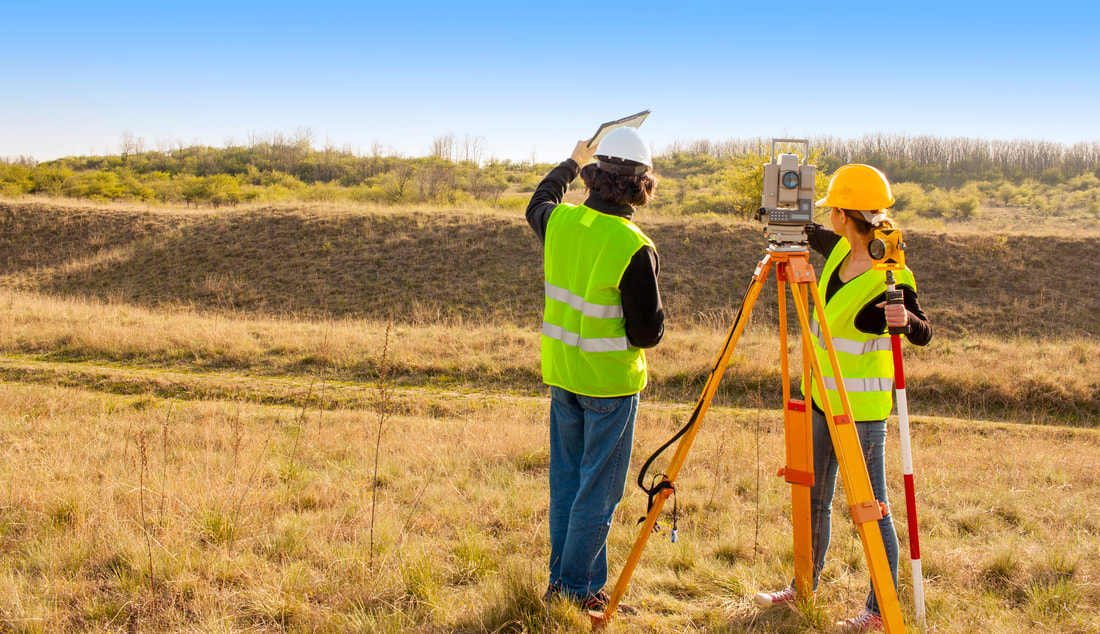|
Written By:
LAN Associates 6 Common Types of Land Surveys Before architects and engineers can start the conceptual design phase of a property development project, they need to understand the land they are building on. This is where land surveyors come in. They determine what type of land survey you need and then map the parcel of land to define its boundaries, topography, and other features. This vital first step informs many subsequent project decisions, so it is important to understand the process. Below is a quick primer on the common types of land surveys. This guide will help you identify what to expect during this key step in the property development process. Boundary Surveys: Boundary surveys are conducted to establish or re-establish and document the precise boundaries of the land a project will be built on. This includes measuring and mapping the land’s corners, lines, and monuments to determine the limits of the property. Boundary surveys are a vital part of buying and selling property and resolving disputes about where property starts and ends. If you want to put up a fence or any other structure close to property lines, you need a boundary survey to help guide your project. Topographic Surveys: Topographic surveys map the natural and artificial features of a piece of property. The goal of a topographic survey is to provide detailed information about the contours, elevations, vegetation, water bodies, structures, and other characteristics of the land. This type of survey provides a comprehensive understanding of terrain which is vital for site development and landscape design. ALTA/NSPS Land Title Surveys: ALTA/NSPS (American Land Title Association/National Society of Professional Surveyors) Land Title Surveys, commonly referred to as “ALTA’s”, are detailed surveys conducted during real estate transactions. They follow strict standards and provide a host of information about boundaries, easements, encroachments, and zoning restrictions. Insurance and title companies often require ALTA surveys to determine if there are any potential risks associated with the property. Construction Surveys: If you are going to perform construction, you will likely need a construction survey to assist with the planning and execution of your project. A construction survey helps establish precise locations, elevations, and dimensions for project features like structures, roads, and utilities. The survey crew will take the proposed information depicted on the approved construction plans and place markers in order to relate them to the actual location on the particular property. This type of survey helps ensure accuracy during the building process, and it helps the architecture and engineering teams implement their designs and specifications in line with legal requirements. Subdivision Surveys: When dividing a large parcel of land into smaller lots, you need a subdivision survey. This helps determine the boundaries, dimensions, and legal descriptions of individual parcels of land. Subdivision surveys are common when new neighborhoods are planned in urban development and for dividing up land for sale or for development purposes. Elevation Certificates: An elevation certificate is a document that provides information regarding a building’s location, lowest point of elevation, flood zone and other characteristics, according to the Federal Emergency Management Agency (FEMA). These elevations must be tied to the same datum as shown on the existing FEMA mapping and the certificates are currently utilized for flood insurance purposes or during the building process for new buildings in flood-prone areas. What Should I Do if I Need a Survey? Whether you are building a single-family residential house, a municipal building, or a K-12 school, it’s essential to start your project off with a proper understanding of the land you are building on. LAN Associates has a dedicated team of surveyors with decades of multi-sector experience who can help you determine what type of survey you need and then execute the needed work.
0 Comments
Leave a Reply. |
Guest Blog
Archives
July 2024
Categories |
- About Us
- Events & Programs
-
Forums
- Diversity, Equity & Inclusion Forum
- Environmental Business Council
- Family-Owned Business Forum
- Healthcare Foum
- Higher Education Forum
- Human Resources Forum
- International Forum
- Manufacturing Forum
- Marketing Forum
- Next Gen: A Young Professionals Organization
- Non-Profit Forum
- Real Property Forum
- Technology for Business Forum
- Transportation Forum
- Women in Commerce Forum
- Membership
- COMMERCE Magazine
- Member Directory
- Member News
- Guest Blog
|
Copyright Commerce and Industry Association of New Jersey. All Rights Reserved.
365 West Passaic Street Suite 490 | Rochelle Park, NJ 07662 Phone: (201) 368-2100| [email protected] | sitemap |


 RSS Feed
RSS Feed
